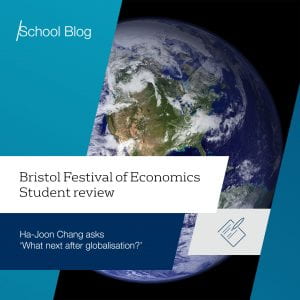 This November saw the return of the annual Bristol Festival of Economics by Festival of Ideas. Undergraduate student Ben Pimley provides a review of Economist Ha-Joon Chang’s talk, ‘What Next After Globalisation?’
This November saw the return of the annual Bristol Festival of Economics by Festival of Ideas. Undergraduate student Ben Pimley provides a review of Economist Ha-Joon Chang’s talk, ‘What Next After Globalisation?’
Ha-Joon Chang may be a household name to many young economists given that he wrote the Personal Statement staple ’23 Things They Don’t Teach You About Capitalism’, but as an academic economist at Cambridge University he is particularly interested in the role of the state in economic policy. This naturally leads to studying globalisation and as the title of his talk suggests, he is sceptical about our current phase of globalisation.
Definitions are important here and Chang defines the current period as ‘post-1980s globalisation’, which is the era most people associate with the legacy of neoliberal, deregulatory reforms by Thatcher and Reagan. Globalisation itself, defined more broadly as increasing interactions between countries across the world, traces its roots back at least five centuries to the first sea-voyagers like John Cabot (Giovanni Caboto), whose influence is felt even today through the eponymous shopping centre!
Chang provocatively argues that the statement “we are richer than ever” is meaningless, or more correctly, a tautology if there is a positive GDP growth rate. This shouldn’t be taken for granted given that the Malthusian Trap looms large for most of human history, but it is certainly a sign of human progress that we are now concerned more with distributing the spoils of our increased wealth rather than the rate of growth itself.
As all good economists do, Professor Chang asks the question ‘could we have grown even more with a different policy prescription’. His answer is a fairly unequivocal ‘yes’ given that inequality has risen in a majority of countries since 1980, with a few noble exceptions. Chang points out that it doesn’t have to be this way though – in terms of capital mobility the world was more globalised on the cusp of war in 1914 than in the 1970s. The answer he posits is seemingly greater regulation and a more generous welfare state.
He left the challenge of specific policy decisions to future economists but notably described universal basic income as “pie in the sky” for developing countries. As a suitably prescient but sombre end to the talk, he reminded us of the need to look at a broader range of factors to assess progress, not just GDP. After all, in his own words, “if we get climate change wrong we are all toast and there will be no economy to grow”.
The dismal science remains undefeated!

